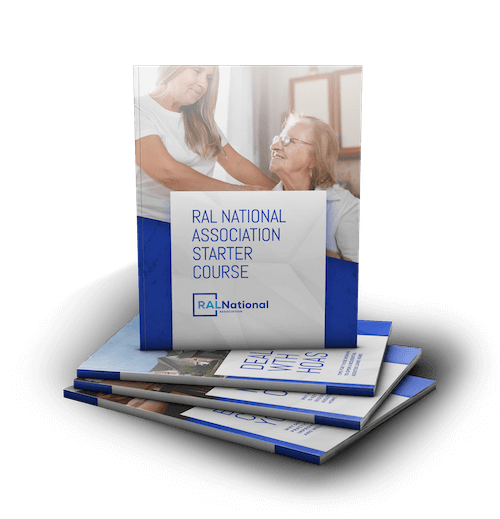Communication, communication, communication. It’s essential in marriage. It’s essential in the workplace. It’s certainly in politics. Communication is such a rudimentary thing; yet, so many struggle to excel at it.
Why? The key to communication is simple. It is so simple most miss it. Many miss it all together because of selfish ambition.
What is the most important aspect people fail to latch onto when communicating? Listening.
If you seek to become an effective communicator you had better learn to listen well. Listening includes more than just the words someone has spoken, but it is also:
- Discerning intent
- Reading body language
- Paying attention to diction
- Determining what is not being verbally communicated
By developing competency in these areas, one will become an effective listener.
Listening is so crucial in the residential assisted living industry. Prospects are not looking to purchase a second home or a pair of shoes. They are examining a place to have their aging loved one reside. This is a sensitive topic and an excruciating decision.
Sales associates and intake managers in residential assisted living homes should be aware of the sensitivity necessary in sales professionals who seek to be both helpful and successful in the RAL industry.
The sales associate’s success is the family’s success. The two are intricately intertwined.
Guess what?
It all begins with communication. Let’s explore the above criteria and help you develop into a top-notch empathetic and successful sales associate or intake manager.
THE BACKBONES OF COMMUNICATION
Communication for a sales associate in the residential assisted living industry is essential to doing what other senior living models are unable to do – offer comfort with independence.
Communicating this is essential to be able to hang that proverbial sign “No Vacancy.” Seriously, you will not hang this sign, but you will have to inform many potential prospects looking for a place for their elderly mother or father that your home has no current vacancy.
One of the best ways to develop a prospect list is to have a fully occupied home.
1. Discern Intent
As a residential assisted living home sales associate, you should be fully aware and fluid in knowing what your home offers, what your home can offer, and how easily integrating services into your home is. What you do not know is what your prospect needs and wants. Additionally, you do not know what they need beyond what they understand as their needs.
That’s right, many prospects think they know the extent of their needs, but tend to discover their needs are more vast than they anticipated or understood. As a residential assisted living home sales associate, you act not as a sales person, although you are one. You behave as a consultant. You know your home, the industry and have experience with residents. You actually have more information than your prospects, be they the senior or his/her adult children.
While you are equipped with a plethora of expert information, keep it to yourself. First of all, prospects tend to be “put off” by knowing it all. Prospect prefers to arrive at their own decisions, not coerced by a pushy sales person. Therefore, you must master the art of silence.
After introductions, smile, and ask what you can do for them? Do not ever assume you know. They may not want a tour. They may want to express their sincere concern with placing their loved one. They may want to understand the cost structure more. They may even want to talk with some residents who can really help them understand what life is like behind the closed doors of your residential assisted living home.
Therefore, listen to the prospect. Your listening, however, is not passive. It is very much an active exercise. You are listening for the intent behind the words being expressed. In other words, you must discern the “why” behind every demand or reason given. The sales associate who discerns the “why” gets the sale. It is that simple, but it is not easily done.
- When a prospect tells you why they are looking for a residential assisted living home ask “What has brought you to us?” Then be quiet and let them ramble to it. They will get to it. If the answer is vague, smile and ask why again. You need to know this.
- Ask about their beloved senior? Ask about the potential resident’s background, not just their health conditions. Remember, residents are more than their health challenges. They are people who had a life outside of the walls of your RAL home. Find out who that person was?
- Ask “what do you envision as an ideal place for your mother?” Let them go on continually. They will tell you everything they want for mom, but you must listen and discern the wants from the needs?
- Do the wants and needs complement one another?
- Are they mutually exclusive?
- Are they ideal? Possible? Foolish?
- Finally, ask the prospect what they perceive as the greatest needs of their senior? This is getting down to business. Listen intently, even take notes. You need to make sure you know what they perceive as the greatest needs. Sometimes tears flow at this point because the prospect is verbally expressing what his/her beloved senior can no longer do for themselves.
You must really listen to what the prospect’s intent is for their senior. It is the intent that must be addressed and clearly agreed upon in order to have a happy resident and a happy family.
2. Read Body Language
This is perhaps one of the most commonly overlooked aspects of sales. Body language communicates much more than words.
- Genuine smiles are different from forced ones.
- Crossed arms are not welcoming ones.
- Squinting eyes see something wrong.
- Cupped chins are inquisitive.
- Tilted heads want to understand.
- Arms folded behind the back are comfortable.
- Hands in pockets are ready to depart.
- Gentle laughter wants to like what he/she is seeing or hearing.
- Robust laughter has found a home.
- Teary eyes realize the need to make the decision and will more than likely look to you to help them arrive at it.
There are more body language ques, but these are very common. Become accustomed to seeing these. Know what to do when you see each.
If it is a negative body language, ask a question that is open-ended; in other words, a question that requires a detailed explanation not a quick affirmative or negation. Address the challenge head-on. Do not “sugar coat” anything. You must be honest with the prospect. This will establish trust and trust leads to comfort which drives placement.
If the body language is positive, you still need to know why. So, ask. Be honest and say, “you appear to be enjoying yourself. Let me in on the fun.” Guess what? They will. As with the negative body language, your inquiry will lead to a detailed answer, which you can affirm and establish trust. Trust is key.
3. Diction Detail
What words does your prospect use? What vernacular do you hear? Is there a regional accent? Listen and then listen again. Use the words your prospect uses. This is why sales associates should be ferocious readers. You need to have an extensive vocabulary and a wide range of knowledge. Residents will visit your home or call from all over the nation and sometimes the world. Therefore, be knowledgeable.
If you hear language indicative of urban living, complement your response as such. If you hear words and sayings common in rural settings, respond in kind. Likewise, if you detect a regional dialect or accent, ask. People love to tell you where they are originally from. They love to share their story. Let them and listen intently. Their story will communicate to you their need and their reason for seeking your residential assisted living home.
Likewise, people like to hear your story, too. That’s right. Tell them a bit about yourself. This is how relationships are cultivated. Relationships lead to residents. They want to place mom or dad with someone they know, something with whom they have a connection.
4. What Has Not Been Said?
Once a prospect is comfortable talking and you have discerned the wants and needs as well as comprehended their body language and the prospects derivation, you need to know what they are not telling you. Believe it or not, people keep secrets. Surprised? You should not be. Secrets are the way people protect themselves from embarrassment, shame, and alienation. While secrets are kept by many, your future resident can not harbor them. What secrets do you need to know?
- Psychological Challenges
- Potential hospitalizations
- Cultural/Racial Biases
- Language Difficulties
How do you find these out? Simple. Communication. That’s right, you’ve been listening and surely you have questions by this point. There are puzzle pieces missing and you need to find them. This is crucial because you do not want to admit a resident you may have to relocate 30 or 40 days after admission because of information you missed. This is horrific. Find out what they are not telling you.
People will begin to tell you about their parents’ past troubles, racism, traumas, and the list goes on. You need to know that, especially if the resident is to have a roommate. Be careful, kind, and courteous. Make sure your prospect knows you appreciate their candor and celebrate their bravery in telling you. Let them know you do not judge them differently because of this information, but you want to ensure you do what is best for their parent. Let them know their family is expanding and some of the sensitive information needs to be known in order to care properly for their senior.
15 COMMUNICATION SKILLS THAT ARE CRUCIAL TO SALES SUCCESS
Good communication is crucial to locking in good leads. Sounds obvious, right? You can’t fill beds unless you’ve demonstrated value to a prospect. You can’t do that unless you’ve understood their problems and devised a strategy to solve them.
In turn, you can’t do that until you get your prospect to tell you what’s wrong.
So, communication is key. We wrote this guide to unpack why communication in sales is so important and explain 15 helpful skills to cultivate across your sales team.
Communication Skills
- Pay full attention.
- Practice active listening.
- Read body language (and control your own).
- Master the nuance of voice tones.
- Be empathetic.
- Understand what’s not being said.
- Speak in specifics.
- Be a subject matter expert.
- Be genuinely curious.
- Don’t act like you know everything.
- Assume good intent.
- Always be honest.
- Don’t make assumptions.
- Be persistent, not pestering.
- Be comfortable with silence.
WHAT’S THE IMPORTANCE OF COMMUNICATION IN SALES?
The root of sales success is the ability to gather and provide information in a way that makes your prospect want to do business with you. Your value proposition, your pricing, even your product’s features — none of that matters unless you’re able to get your prospects to talk to you and also listen to what you have to say.
That means you have to be incredibly attuned to your buyer and understand what they mean when they tell you — or don’t tell you — something. It also means that you can’t just reel off a list of benefits or reasons to work together.
You’ve got to understand how your prospects learn, what they care about, what communication style they prefer, and adapt your strategy accordingly.
So, before you immerse yourself in buyer personas, case studies, and marketing collateral, work on these skills to ensure that when you’re talking to a prospect, you’re sending the right message.
COMMUNICATION IS YOUR PATH TO SUCCESS
As a sales professional or assisted living intake manager in a residential assisted living home, getting to know your prospect’s family is just as critical as knowing the future resident.
Everyone involved in the senior’s life needs to understand where their loved one is being placed, what can be expected, and what will be needed. Leave no stone unturned.
Be mindful, the potential resident could be your mother, father, aunt, or uncle. Guess what? It might be you one day?
Therefore, care enough about people to tell them the truth and listen to them actively.
This is a very sensitive decision and it requires someone to help these families do what is best for their beloved senior. Do not treat this as a transactional sale.
This is a consultation to prepare a senior to make a major life transition.
One you may have to refer to another home because of a specific need; however, do not fret. With the Baby Boomers breaking records in senior living, there will be plenty of prospects to be evaluated for placement in your residential assisted living home.
The Residential Assisted Living National Association will help you eliminate vacancies in your assisted living business.
Contact RALNA to become a member and learn how to experience success at every turn.











